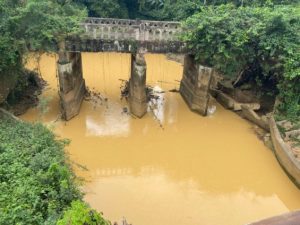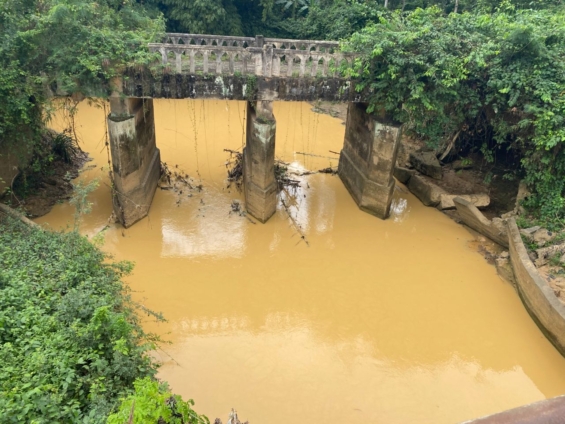
Accra, Ghana//-The crisis before us, a relentless, self-devouring assault on the very earth beneath our feet, is not merely an environmental disaster. It is the chilling, irrefutable evidence of a profound governmental paralysis.
The systemic failure to contain this destructive surge, known as galamsey, is not due to a lack of capacity, but the grim consequence of structural corruption and political complicity that actively dismantle the rule of law from within.
This is not a lapse in governance; it is the establishment of a parallel power structure, a golden pyramid of impunity, whose apex is shielded by the very officials sworn to protect the state.
The galamsey syndicate operates with the precision of a shadow government, built upon a clearly defined, pyramidal hierarchy designed for perpetual operational security.
The Base: The Miners (The Foot Soldiers) are the visible tools of destruction, the shop-floor operators who execute the physical mining. They are expendable and easily replaced.
The Mid-Tier: Local Facilitators (The Enablers), comprising local community leaders, traditional chiefs, and elected Assembly members, provides the essential lubricant for illegality.
They grant access, silence local resistance, and provide immediate intelligence on law enforcement movements.
They represent the localized political and traditional capital invested in the crime. This critical layer is implicated by continuous reports of a catch-and-release pattern, where the powerful influence of local authorities ensures that enforcement remains ineffective and discriminatory, promoting inequality.
At the zenith of this structure, The Apex: The Political and Governmental Elite (The Protectors), sit high-level politicians and top government officials.
They are widely believed to be the ultimate funders of the syndicates, providing not only the capital for excavators but, more crucially, the strategic protection that renders enforcement actions politically sterile. This apex is the shield, deflecting justice and ensuring operational continuity.
This corruption is not a passive sin of omission; it is an active, operational sabotage that weaponises the state’s own legitimacy against its enforcement bodies.
Consider the stark betrayal of 3rd November 2025. In a dramatic display of institutionalised resistance, a mob reportedly under the direct leadership of Ebenezer Kwaku Addo, the National Democratic Congress (NDC) Member of Parliament (MP) for Asutifi North, violently assaulted the IGP’s special task force during a crucial excavator seizure.
The MP, a figure of constitutional authority, became the field general for a criminal defence operation. This single act illuminates the existential threat to the state: local enforcement teams of the Ghana Police Service (GPS) are not merely operating against criminals; they are compelled to operate against politically sanctioned figures.
This dynamic profoundly erodes the morale and operational security of the GPS, effectively neutralising the state’s enforcement capacity from within.
The gravest example of this institutional betrayal is seen in the corruption charges filed by the Office of the Special Prosecutor (OSP) in April 2025 against Charles Bissue, the former Secretary to the very Inter-Ministerial Committee on Illegal Mining (IMCIM) tasked with ending galamsey.
Even after the arrest of MP Kwaku Addo, the court granted him notably lenient bail conditions (GH¢150,000 with unrestricted movement), demonstrating how political status translates directly into judicial shielding, prioritising the rights of the accused official over the severity of the environmental crime.
Furthermore, the OSP’s investigation into allegations of influence peddling related to the “Galamsey Economy” documentary, involving a former Minister of State at the Ministry of Finance, Charles Adu Boahen, underscores the unsettling penetration of high finance and political decision-making by illicit mining interests.
The systemic failure is further crystallised by the infamous case of the 500 missing excavators seized from illegal miners, which vanished into the opaque waters of institutional complicity, rendering seizures futile.
The law’s reach is retracted not by external force, but by the internal, paralysing weight of political mandate.
The Constitution’s clarity is betrayed when its beneficiaries become its most dedicated antagonists.
To ensure the continuity of their lucrative enterprise, these syndicates systematically target the external oversight necessary for public accountability.
The suppression of the free press acts as an airlock, sealing off the illegal operations from public and global scrutiny.
The brazen attack in February 2025, where journalists investigating illegal mining were assaulted, their equipment seized, and their footage forcefully deleted, is a chilling testament to this strategy.
This coordinated suppression of independent scrutiny is designed to secure operational space and ensure the narrative remains controlled.
By isolating enforcement teams and controlling the information flow, the syndicates ensure that the moral outrage necessary to sustain a political clean-up is perpetually dampened.
Compounding the state’s difficulty is the constant infiltration of its own anti-galamsey efforts: as recently as November 2025, the new National Anti-Illegal Mining Operations Secretariat (NAIMOS) arrested armed individuals masquerading as a task force, claiming ties to local traditional authority to extort and facilitate the very crime they pretended to fight.
The illegal mining crisis, therefore, is not merely about ravaged landscapes; it is a profound crisis of sovereignty.
While the government has correctly launched a Five-Pillar Strategy and implemented a new excavator import permit regime in 2025, these strategic intents are immediately undercut by the paradox of political expediency.
The September 2025 announcement that the state’s new Gold Board (GoldBod) would not distinguish between legally and illegally mined gold for sale represents a high-level policy choice: the prioritisation of revenue over the rule of law.
It is the tragic juxtaposition of a national aspiration for development against the corrosive self-interest of its ruling class.
The vast stretches of polluted water bodies and scarred earth are not just environmental wounds; they are the symbolic reflection of a broken social contract.
The pyramid of impunity stands tall because its base is protected by the mid-tier, and the mid-tier is funded and sanctioned by the apex.
ALSO READ:https://africaneyereport.com/how-ghana-is-wasting-its-abundant-water-resources/
Until the government finds the moral and political fortitude to dismantle the apex, to hold its own high-ranking officials to the same measure of justice applied to the foot soldiers, the environmental battle remains unwinnable.
We must recognise this truth: The failure to contain galamsey is not a deficiency of power, but a political choice to accommodate corruption.
The soil is poisoned, the rivers are dead, and the integrity of the nation is draining away, one shovel-full of dirt at a time.
By Raymond Ablorh, African Eye Report


